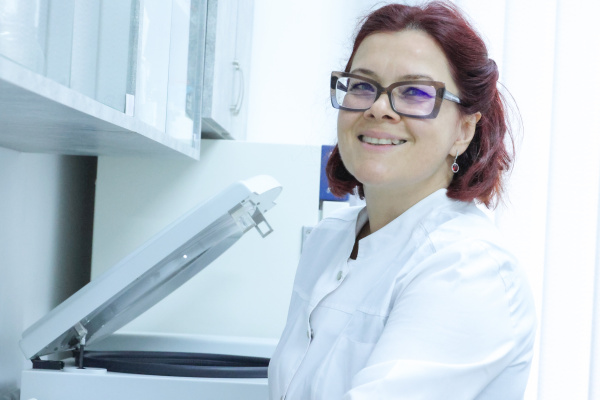September 10, 2024 | 12:50
Science
Research
Publications and scientific journals
YSU scientist's project aims to increase honey quality
Inga Bazukyan, Associate Professor at the Chair of Biochemistry, Microbiology, and Biotechnology in the YSU Biology Faculty, is one of the winners of the "Program for the Empowerment of Women Leaders - 2024" competition announced by the RA Ministry of Education, Science, Culture, and Sports (MoESCS). Her project focuses on investigating the microbiome of honeybees' gastrointestinal tracts, analyzing how it is influenced by seasonal changes and the effects of insecticides. This research aims to increase the immunity of bees and improve the quality of honey.

Speaking about the relevance of her research topic, Inga Bazukyan highlighted that the health of honeybees - one of the planet's most crucial pollinators - has become a major concern globally. She pointed out that recent studies reveal the significant role of gut bacteria in maintaining bees’ health.
"Unfortunately, several factors can affect the bacteria in the intestines, leading to various disorders. A decade ago, it was discovered that most of these bacteria are classified as lactic acid bacteria (LAC). LACs produce a range of compounds with diverse biological activities. These compounds can suppress pathogens (such as bacteria, fungi, and viruses), break down complex polysaccharides and proteins, and have antioxidant activity," said the YSU scientist.

Inga Bazukyan also emphasized that, while there are numerous reports on the synthesis of antibacterial compounds by LACs, relatively few studies have investigated the inhibitory activity of the microbiota in the gastrointestinal tract of bees.
"It is assumed that the ecological conditions and geographical location of Armenia led to the development of unique coexistence in the gastrointestinal tract of bees. To date, no studies have been published on the bacterial composition of the gastrointestinal microbiota of Armenian bees," she emphasized.
The main goals of this project are to perform a comparative analysis of the microbial composition in bees' intestines throughout different seasons, identify variations in the microbiota at various stages of bee development, and assess the impact of pesticides on the microbiota. Additionally, the project aims to isolate LACs and other bacteria present in the microbiota of healthy bees and evaluate their biotechnological potential.
Inga Bazukyan asserts that the project will provide new insights into understanding the role of microbiota in ensuring bees' immunity to various diseases. Additionally, it offers an opportunity to improve the quality of honey through the addition of LACs with antagonistic activity and to develop new products based on these advancements.
This project is the logical continuation of the scientific research conducted under the YSU internal grant for 2022-2025. Over the past three years, with funding from YSU and under the leadership of Inga Bazukyan, a comparative analysis of the bacteria living in the guts of bees from various regions of Armenia was carried out. More than 60 LACs have been isolated, with the most active strains identified. According to her, these bacteria will be used to increase the immunity of bees.

Inesa Semerjyan, postgraduate student Tigran Aleksanyan, and master's student Ruzanna Harutyunyan will work under the leadership of Inga Bazukyan on the scientific project implemented within the framework of the "Program for the Empowerment of Women Leaders - 2024".
For over 5 years, the group has collaborated with beekeepers and the "Beekeeping Forge" Scientific-Educational Center, fostering direct connections between specialists in various fields of beekeeping. Additionally, the Bioinformatics Department at the Institute of Molecular Biology supports the bioinformatics processing of all data collected within the framework of this collaboration.
Peter Vandam, Professor at the Microbiology Laboratory in the Faculty of Sciences at Ghent University and Director of the BCCM/LMG Bacteria Collection, will visit Armenia during the research conducted under the "Program for the Empowerment of Women Leaders - 2024". As the foreign consultant of the scientific group, his visit will focus on developing the MALDI-TOF MS methodology in Armenia for microorganism identification through the proteomics of isolated strains. The agenda also includes discussing the obtained data and planning future publications to determine the next steps for the project.

The research will span approximately three years, from 2024 to 2027. Inga Bazukyan noted that the project plans to acquire two beehives with bee colonies, which will be installed at a private beekeeper in the Noragavit administrative district of Yerevan. According to her, this will facilitate the swift execution of research on animals and the subsequent analysis of data.
The findings from the studies will be published in high-ranking international journals and presented at international conferences. Additionally, seminars on accessible science for high school students will be organized on the topic. A master’s thesis will also be prepared as part of the program, and the data collected will serve as the basis for a future doctoral dissertation.

